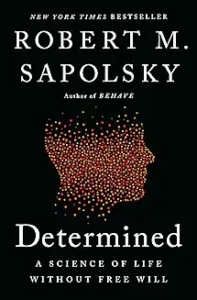Determined: A Science of Life Without Free Will by Robert Sapolsky 2024
I have a love/hate relationship with this book. As soon as I read about it, I was intrigued. Who wouldn’t want to read a book that claimed that we humans have no free will, that all of our behavior is determined. So I proceeded to check this 519 page tome out of the Cambridge Public Library. I didn’t even open it before it was due. So I then loaded it in my Kindle, but again failed to get much beyond the introduction. I then checked it out of the Harvard Library figuring that the one semester period of loan for a faculty member would enable me to read it. Wrong. It was only on our trip to England that I re-opened the Kindle version on the long flight over the Atlantic, and I was completely hooked.
Sapolsky, a 67 year old professor of biology, neurology and neurosurgery at Stanford with an enormous beard and in all likelihood, sparkling blue eyes, writes with humor, wit, tongue-in-cheek, to accompany a wide sweeping knowledge of biology, neuroscience, genetics, and psychology. His prose is smooth and fast-paced as well as up to date in its derogatory references to trump. And, at its core, he makes a strong argument that despite our intutitive sense that we are free to make decisions and despite the new knowledge that has come from chaos theory, emergent system theory, and quantum science, each of us is the product of millenia of evolution, our genes, our fetal environment, and our childhood experiences, all of which combine to determine our behavior. To make his case, Sapolsky shows that the biology of behavioral change in humans is the same as when a sea slug learns to avoid an electric shock—the antiquity and ubiquity of these biological gears involve the same molecules, genes, and mechanisms of neural function in both the sea slug and in me. Paradoxically, this shared biological substrate provides grounds for optimism.
On page 268, Sapolsky writes, “This book has a goal—-to get people to think differently about moral responsibility, blame and praise, and the notion of our being free agents. And to feel differently about those issues as well. And, most of all, to change fundmental aspects of how we behave.” At its core, this book makes the case that we need to alter how we view human behavior, removing the punishment that accompanies anti-social and even criminal behavior as well as limiting the credit we heap on individuals with major accomplishments. Sapolsky would argue that Eric Kandel no more deserves his Nobel Prize than Timothy McVey deserved to be executed for the bombing of the Federal building in Oklahoma City. Both of them were simply carrying out decisions that had been determined by their circumstances.
Sapolsky admits that changing our system of reward/punishment may well be impossible and extremely unlikely but he’s playing the long game, siding with the incompatabilists (i.e. those who feel that free will is incompatible with the evidence) while the huge majority of philosophers are either compatabists or sorta-compatabilists. He cites the history of how society viewed those individuals with grand mal seizures, moving from seeing them as witches possessed by Satan to treating them with compassion, medication, and understanding. He also cites the differences in how Norway and the US manage violent crimes. We punish or execute those who murder; Norway sentenced the mass murderer to the maximum 21 years in a prison where he is contained, not punished.
This is a fascinating book and one which I’m sure, would yield even more startling and impressive information with a second reading. If you have any question about whether you should have been punished when you hit your younger sibling when you were ten, read this book and you will feel exonerated.



